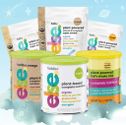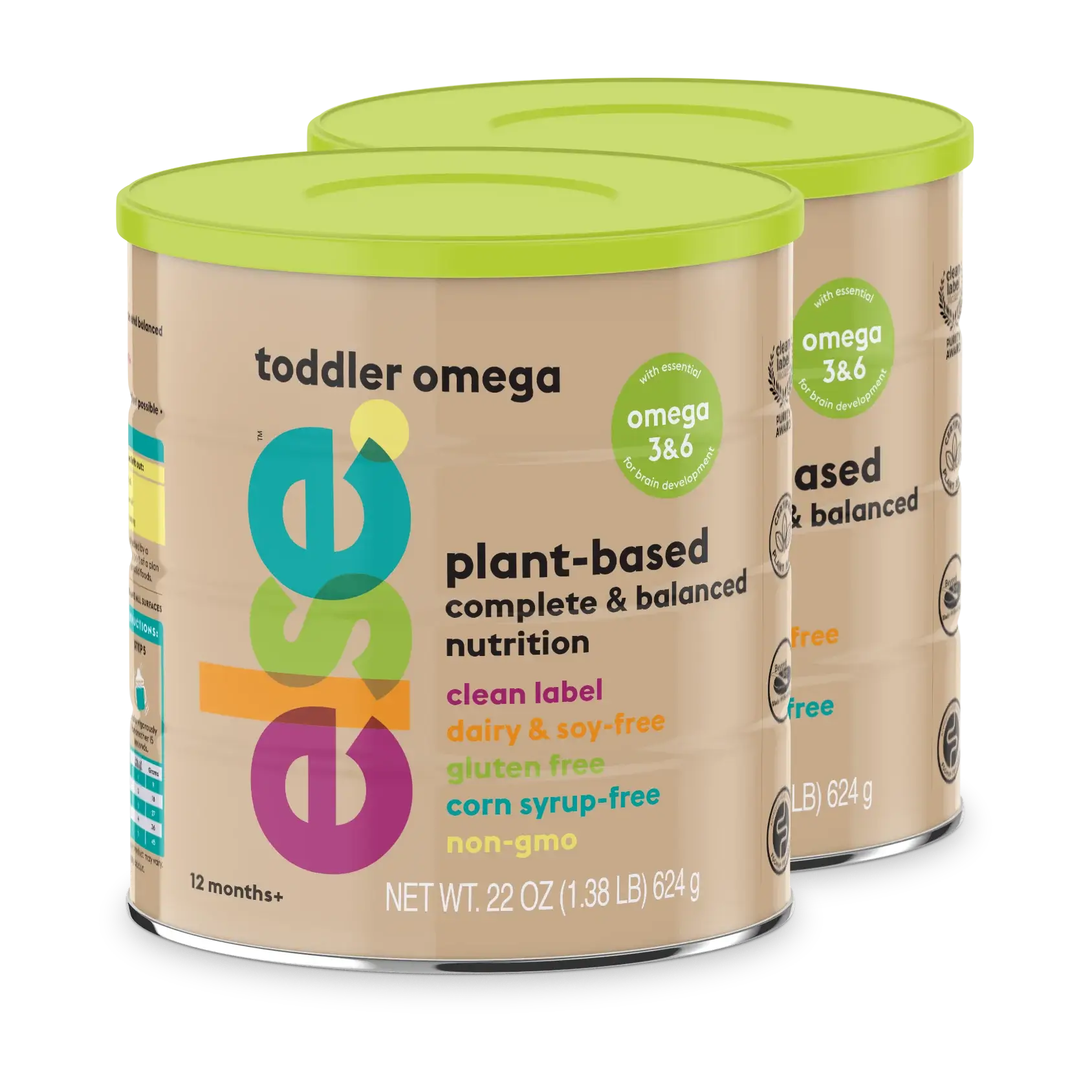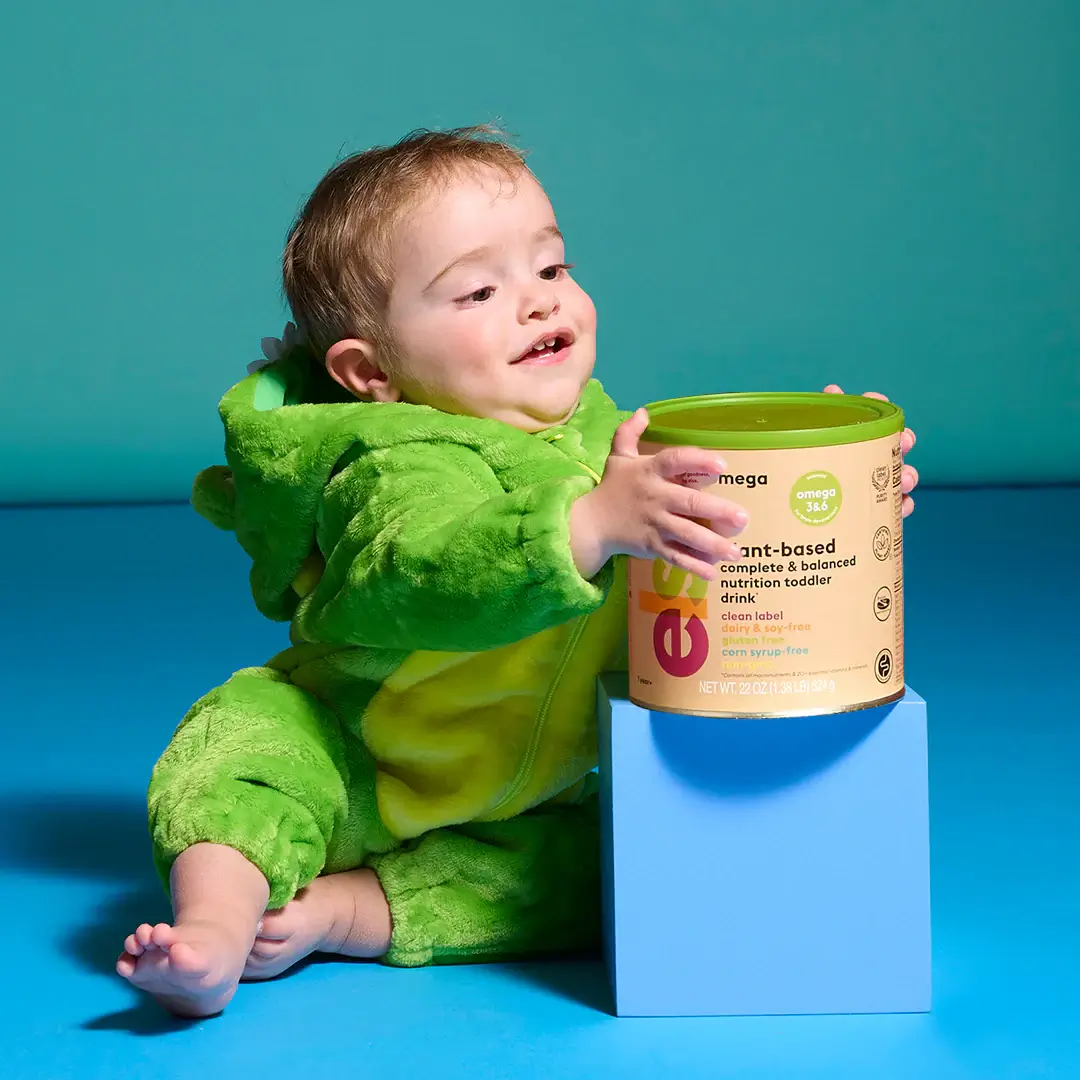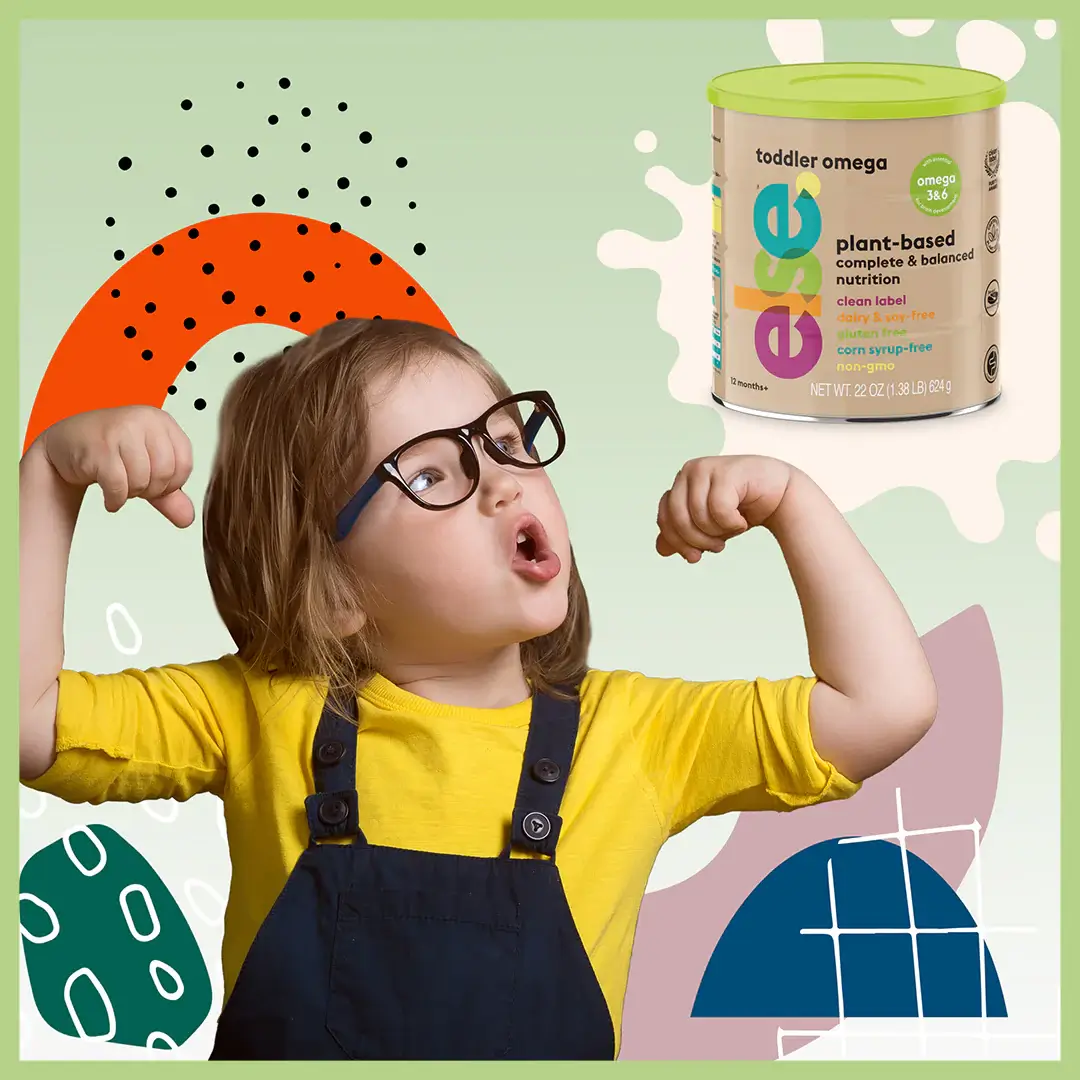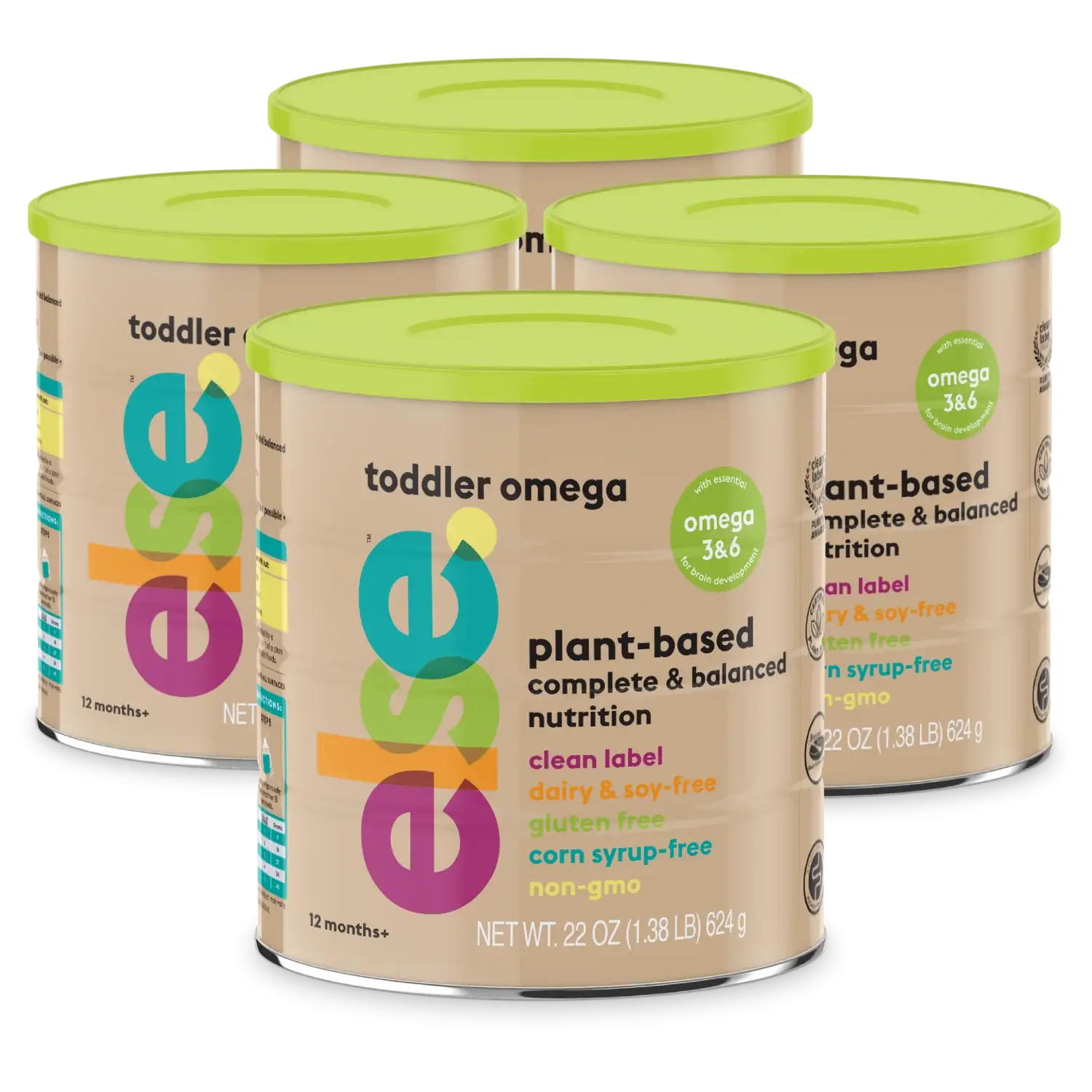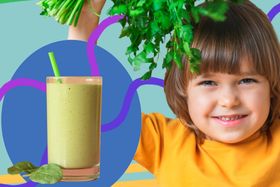Best Age For Vegan Baby Formula: Does Age Play a Factor?
If you are considering feeding your child an alternative to traditional milk formula, you can consider feeding him or her vegan formula for babies.
Published June 12, 2024

Baby formula is a great option for many families and an essential one for some. While breast is best, breastfeeding is not always possible or sustainable for some families for a multitude of reasons. If mom can’t breastfeed, is returning to work and needs to supplement, doesn’t produce enough milk to sustain growth and development, or a baby is adopted (just to name a few), formula can play an integral role in the child’s health.
Is there a vegan formula for babies? If you are considering feeding your child an alternative to traditional milk formula, you can consider feeding him or her vegan formula for babies. What your child needs differs at every age, so it’s important to select the right formula for the right time in your child’s life.
» Learn more about the safety of vegan formula for babies
When is The Best Time to Introduce Formula to Your Toddler or Infant?
In short, the best age for vegan baby formula will depend on the child. Each child’s needs vary based on health, weight, nutritional deficits, and situation. It’s important to talk to your doctor about which is the best vegan baby formula for your child and when is the best time to introduce it.
If breastfeeding isn’t possible, it’s safe to introduce formula to infants from the start. While breast milk is the best source of nutrition, baby formula, including vegan formula, is developed to mimic the properties of breast milk.
» Here are some tips on how to transition away from breastfeeding
As your child grows up, though, their nutritional needs change, and so should their formula. Infants and toddlers need different things from formula. So while it is both safe and sometimes necessary to introduce formula to infants, they should not receive the same formula in their first year of life as they do after 12 months old.
Toddlers shouldn’t keep consuming infant formula after they turn one and infants shouldn’t consume toddler formula either. While they can be similar, toddler formulas are designed to supplement the diet of children who are also eating regular food.
What Do Infants Need From Formula?
Your baby’s first year of life is a period of rapid growth and infant formula supports this growth by providing adequate macronutrients and micronutrients. These essential nutrients help not only your baby’s body develop but also their mind.
Your baby will require high levels of carbohydrates and fats, and some protein in this first year. These three macronutrients form the foundation of all infant formulas.
» Ensuring your baby gets the right nutrients in their first year is vital. Learn about complete nutrition for babies
In the past, the market for infant formula has been primarily made up of cow’s milk protein-based formulas, soy-based formulas, and protein hydrolysate formulas. These use cow’s milk or soy as the primary protein source. Traditional formulas use lactose, corn syrup, or sucrose as the main carbohydrate source, and various vegetable oils as the fat source.
However, there is a vegan, plant-based alternative that is free from animal and highly processed ingredients. Else uses whole food ingredients such as almonds, buckwheat, and tapioca to meet the macro- and micro-nutrient needs of babies.
What do Toddlers Need From Formula?
At 12 months of age, babies are developmentally ready to be weaned from breast milk or infant formula. As their palates expand and their diets become more diverse, this can often be an appropriate time to introduce a toddler-focused formula.
» Learn how to make the transition from breast milk to formula
Toddlers require slightly different levels of macronutrients and micronutrients and their formulas reflect this. Traditionally, the main difference between toddler and infant formulas is that toddler formulas contain greater amounts of calcium and phosphorus, designed to match the higher calcium and phosphorus levels children need as they grow.
It is around this time that many toddlers start drinking whole milk and/or eating full-fat dairy products as well. When dairy or soy is not an appropriate or desired product for your toddler, there are vegan, plant-based options to choose from that offer a similar amount of calories and total fat as whole cow milk, with far less saturated fat and more iron, which is a common deficiency that can arise in the toddler years.
Reasons to Consider Vegan Baby Formula
There are plenty of reasons to consider vegan formula for your infants and toddlers as an alternative to dairy or soy-based formula.
Allergies
Most of the formulas you’ll find are cow milk protein-based formulas. Many babies may tolerate this type of formula, however, according to the latest research, an allergy to cow’s milk is one of the most common food allergies in infants and young children.
Milk allergy symptoms can appear anywhere from a few minutes after exposure to a few hours after ingesting. The most common symptoms are rashes, eczema, upset stomach, frequent vomiting and, or diarrhea, and blood in the stool. In babies, a milk allergy may cause chronic nasal stuffiness, coughing, wheezing, or difficulty breathing.
» Here's how you can identify a milk allergy in your baby
Children with cow milk protein allergies or other intolerances will require an alternative such as a plant-based formula.
Lacking Nutrition
If your child isn’t keeping up with the growth and development expected by your doctor, it may be because they aren’t receiving enough nutrition. This could occur for a variety of reasons; they may not be able to get enough breast milk due to improper suckling or lack of milk production or they may not be getting the right nutrition from their current formula or foods.
This is a great time to consider supplementing your child’s diet with a highly nutritious plant-based formula.
» Discover why plant-based nutrition is so healthy for your toddler
Difficulty Breastfeeding
Even with the best intentions of breastfeeding, it’s important to understand that there are both personal and medical reasons that make it just not possible. In these times, supplementing with formula is the best option for mom and baby to ensure the baby gets all the nutrients he or she needs to be healthy.
» Take a look at our step-by-step guide to supplementing with formula if you are having trouble breastfeeding
Vegan lifestyle
If you follow a vegan lifestyle and/or are raising vegan babies and want a vegan formula, you may have had a hard time finding options that feel right for your child. The majority of formulas on the market are made from cow’s milk or contain some kind of animal product. Thankfully, this is changing, and now, moms have more options than soy-based formulas to choose from.
How to Introduce Vegan Formula
If you are supplementing breast milk or food with formula or transitioning from breast milk altogether, you should slowly introduce formula to your child.
Slowly integrate formula into your child’s diet by swapping one meal or feeding per day with formula for a few days. This way, you will notice if your child has any negative reactions to the formula.
Or you can supplement a few ounces of formula after breastfeeding. Never mix formula and breastmilk in the same bottle. You can slowly decrease the number of nursing sessions as you increase the formula they are receiving.
Your child will need time to adjust to the formula and perhaps the bottle if you haven’t introduced a bottle before. If you are supplementing with or transitioning from breast milk, consider pumping and feeding so your baby gets used to a bottle.
Choose Something ELSE
There are many different types of formulas on the market, and the choice can sometimes be overwhelming. Else formula may be just the option you’re looking for to supplement breastfeeding.
Else Nutrition for Babies
Else’s future infant formula product will mimic the nutritional gold standard composition values of breast milk. It will be made of plant-based ingredients that provide all the macro and micronutrients your baby needs. It will be made of:
Organic Almond Powder A rich protein source, but also contains biotin, Vitamin E (an antioxidant), copper, and manganese. Almonds also provide good amounts of Vitamin B2 (riboflavin), phosphorus, magnesium, and molybdenum. They are a great source of heart-healthy monounsaturated fat. Almonds are highly digestible prebiotics that favorably alter the microbiome of the intestinal tract.
Organic Buckwheat A high-quality, gluten-free plant with grain-like seeds that offer high-quality protein and nutritious carbohydrates. Buckwheat is a good source of manganese, copper, magnesium, phosphorus, antioxidants, and fiber. It provides your baby with essential macronutrients.
Tapioca
An easy-to-digest form of carbohydrate with little taste, smell, and flavor. It is made using water and an all-natural enzyme.
The formula will also be completely free from genetically modified ingredients, as well as antibiotics and heavy metals.
Else Nutrition for Toddlers
Else Complete Nutrition for Toddlers is a formula designed to supplement a baby’s diet beyond the first year. It gives your child the purest, cleanest and most complete nutrition intended to promote healthy growth and development during the key time between 12 and 36 months.
The formula is an ideal source of additional nutrition that may be desirable for a variety of reasons such as weaning, providing proper nutrition for picky eaters, as a cow’s milk alternative for lactose intolerant or vegan toddlers, or as simply a healthy, clean, gluten-free, syrup-free beverage your kid will love to drink.
Plus, if your child was consuming infant formula prior to their first birthday, it is an ideal replacement. The shift will provide your child with the right amounts of protein, fiber, fat, and nutrients such as calcium, vitamin D, iron, and B12 they need as they continue to grow.
The formula is also completely free from fillers, highly processed ingredients, preservatives, and additives. It’s the Else way.
The content and advice provided in this article is for informational purposes only and is not a substitute for medical diagnosis, treatment, advice for specific medical conditions. Always consult a pediatrician to understand the individual needs of your child.





